Alumni Career Insights
In addition to reading about the Public Health Career Fields, we recommend connecting with individuals working in these fields to gain insights into the day-to-day responsibilities and work environment. To support you in starting this process, we’ve compiled some quotes from University of Michigan School of Public Health alumni about their roles and advice. Review their experiences working in various public health fields and reflect on what resonates with you.
Environmental & Health Risk Assessment
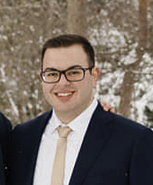 Michael Manning
Michael Manning
What does your work look like on a day-to-day basis?
On a day-to-day basis, I work to implement EHS software solutions for APTIM clients. This can include customer support, troubleshooting, design, implementation, training and data analysis. I am new to APTIM and expect that I will also perform industrial hygiene sampling and occupational safety support for clients in the future.
What advice do you have for Michigan Public Health students interested in your field?
Dive in head first, and learn how your role fits in with the business as a whole. Learn who your partners are and what resources are available to help complete your objectives.
What do you enjoy about your work/career?
The field is incredibly diverse. There are a variety of roles that can be performed in every sector of the economy, each with its own opportunities and challenges. The industry is fast paced and evolving. I enjoy looking for ways to improve programs and processes and safety for employers and their employees.
How did your education/resources at Michigan Public Health prepare you for your role?
My education provided me with the tools that I needed to understand and solve complex problems. The breadth and depth of my education serves as a solid foundation to which I am always building upon as I grow as a professional.
What is the impact you see from the work you are doing in your role?
Addressing EHS software needs for clients can improve compliance, lead to cost savings, reduce risk and improve business insights in addition to improving overall EHS performance.
Morgan Suntken
What does your work look like on a day-to-day basis?
Every day is a little different! At any given time I'm on a handful of different projects ranging from technical writing, contributing to different steps of systematic reviews, or drafting memos and other documents across a wide range of topics. It feels very natural to move into this role from being in a master's program, because you continue rapidly learning, exploring, and gaining new skills. This role affords me the opportunity to be intentional about the projects I take on to concentrate in my preferred areas or build the skills I am seeking out.
What advice do you have for Michigan Public Health students interested in your field?
Take every opportunity presented to you! If there is a class you have your eye on that isn't required for your degree program, take the class. Try different research and work opportunities and look to build hard skills.
What do you enjoy about your work/career?
I love the flexibility and growth element of the role. I am always learning and trying new things, and putting my knowledge and skills to the test. The company is genuinely invested in each individuals' interests and skills, which translates into a lot of guidance and support for staff!
How did your education/resources at Michigan Public Health prepare you for your role?
Taking a wide range of classes in environmental health and policy positioned me well to sit in the balance between science and action. The Careers folks and the alumni network are a solid professional development complement to the technical and subject matter preparation for your career!
What is the impact you see from the work you are doing in your role?
I get to see my work help support projects at the EPA and NIH that have real world implications for science and regulation.
Health Data Science, Analysis & Research
 Shriya Yatnalkar
Shriya Yatnalkar
What does your work look like on a day-to-day basis?
On a day-to-day basis, my work majorly involves managing end to end grant submissions in collaboration with multiple PIs, program managers and Michigan State University personnel(as a result of the partnership). I am also involved in identifying areas of inefficiencies within the grant management team and establishing standard practices/process workflows to optimize operations. My role includes some financial aspects such as budget projections, managing payments to vendors/consultants, and reconciliation of data.
What advice do you have for Michigan Public Health students interested in your field?
Graduating with an MHSA doesn't mean your career has to be limited to Clinical Healthcare. I would advice exploring various options within research or biotech or pharmaceutical industries to help your decision of choosing a job relevant to your skills. Working as a part-time research assistant during grad school helped me understand what research is all about and how I could apply my MHSA education to make a career out of it. Getting certifications like CRA or PMP help tremendously in boosting your profile, and they are almost always mentioned in the job requirements.
How did your education/resources at Michigan Public Health prepare you for your role?
Specific subjects like Accounting and Finance have been most useful for my role as I analyze financial statements on a daily basis and have to make crucial budgetary decisions.
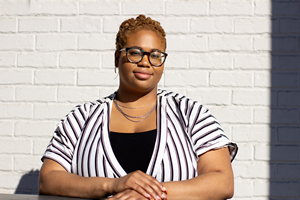 Ebony D. Johnson
Ebony D. Johnson
What does your work look like on a day-to-day basis?
Cu rrently, my day-to-day work involves laying the foundation for Asé Analytics, a company I started two months ago. This includes interviewing potential advisory board members to bring in expertise and guidance, attending relevant events to network and build connections, and submitting RFP proposals to secure projects and funding. Additionally, I'm participating in a science diplomacy training course, which involves some readings and meetings. As I prepare to start a post-doc at Emory University's Rollins School of Public Health focusing on Injury & Violence Prevention in August, I'm dedicating time to background reading in this subject to ensure a strong start. Balancing these diverse activities is both challenging and rewarding as I navigate this exciting phase of my career.
What advice do you have for Michigan Public Health students interested in your field?
For students interested in social epidemiology, my advice is to prioritize building a strong theoretical foundation and embracing interdisciplinary research. Master epidemiologic methods, but don't stop there – dive deep into sociological theories and concepts too. You'll find that understanding the social determinants of health requires a broad perspective, so don't be afraid to integrate ideas from sociology, public health, economics, and environmental sciences. Seek out opportunities to collaborate across disciplines – these experiences will broaden your analytical toolkit and help you tackle complex public health issues more effectively. Hands-on experience is invaluable, so look for internships and research projects that let you apply your skills to real-world problems. Networking is crucial too – connect with professionals in your field and make an effort to attend conferences. It's a great way to stay on top of the latest trends and methods, plus you'll meet some fascinating people along the way. Above all, approach your work with curiosity and a genuine desire to make a positive impact on public health. This field offers incredible opportunities to create meaningful change, so stay passionate and keep pushing forward.
What do you enjoy about your work/career?
I appreciate the collaborative nature of my work, which allows me to engage with diverse stakeholders and leverage their expertise to drive meaningful change. Every day brings new challenges and opportunities, making my career both stimulating and fulfilling.
How did your education/resources at Michigan Public Health prepare you for your role?
The education and resources at Michigan Public Health were instrumental in preparing me for my current role. The rigorous training in epidemiology methods and public health theories provided a solid foundation in research methodologies and critical thinking. The support and mentorship from faculty and peers significantly shaped my career path and professional development. My aspiration to be an interdisciplinary researcher was welcomed and nurtured. Additionally, the camaraderie and support from my classmates created a collaborative environment, where we always helped each other rather than competing.
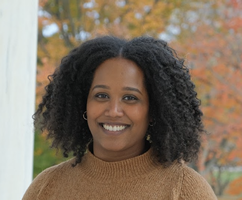 Lello Guluma
Lello Guluma
What does your work look like on a day-to-day basis?
My day to day typically looks like working on data analyses for various dissemination related products such as reports or dashboards. It can sometimes be a fast-paced environment, so occasionally my day to day involves digging into a research question or issue that comes up and requires a short turnaround time.
What advice do you have for current Michigan Public Health students interested in pursuing your field?
Talk to as many people as possible doing the type of things you want to be doing. Simply 'talking' to people is how I ended up in this role. I have learned a tremendous amount from people further along in their career - researchers, health care executives, entrepreneurs or scientists. Some have turned into mentors, and all have provided incredibly valuable advice. Never stop learning from others and you never know where the next conversation will take you!
What do you enjoy about your work/career?
The thing I love the most about my work is the people I get to work with. I am constantly learning and collaborating with the people I work alongside. For me, that is very important.
How did your education/resources at Michigan Public Health prepare you for your role?
Being able to take classes in all different departments helped prepare me for my role. I remember my last semester I took an advanced quantitative methods course which gave me strong R programming skills prior to starting my career.
Health Policy, Law & Planning
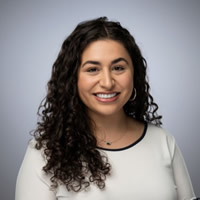 Farah Erzouki
Farah Erzouki
What does your work look like on a day-to-day basis?
In my current role, I focus on promoting policies that help people more easily enroll and stay enrolled in Medicaid coverage. On any given day, I could be researching, writing briefs and conducting webinars on Medicaid eligibility and enrollment policy issues; or working directly with state advocacy organizations to help push Medicaid advocacy objectives forward in their states.
What advice do you have for Michigan Public Health students interested in your field?
There are many ways to gain experience to successfully pursue this field! Personally, I started my career at ACCESS (a community nonprofit organization) and that is where I built experience and expertise in health coverage and access issues. I think a great way to learn more about the policy areas you have interest in working on is by working on the ground with impacted populations. And I got my foot in the door at ACCESS during my time as an MPH student, through my involvement in a research project that partnered with the organization to collect data. There isn't one right path to success in a policy career!
What do you enjoy about your work/career?
I genuinely enjoy being able to work on promoting solutions to big policy problems where you can see the direct impact. So often, people who are eligible for critical programs like Medicaid face administrative burdens that make it difficult for them to successfully enroll. And once they do enroll, they often fall through the cracks due to paperwork issues or communication challenges. In my area of work, impact and progress looks like better and more streamlined Medicaid programs across the country with no barriers to access and retention. I also enjoy being able to work with diverse stakeholders to push this work forward, particularly state advocates, because you get a deeper understanding of the unique challenges happening in each state but also the commonalities.
How did your education/resources at Michigan Public Health prepare you for your role?
My time at Michigan Public Health is the reason I am where I am today! Through my degree, I had the chance to take lots of different classes in topics ranging from social epidemiology to environmental science health to health policy. This coursework allowed me to have a well-rounded understanding of public health while also helping me narrow in on my interests. My research at Michigan Public Health on health disparities in Arab American communities also propelled my interest in health inequities, and introduced me to ACCESS where I began my career.
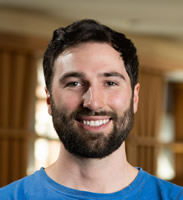 Marc Horvath
Marc Horvath
What does your work look like on a day-to-day basis?
My work offers something new every day, which is something I love about my job. Policy touches everything in a health department. One day I might be meeting with state representatives about proposing new vaping and edible marijuana regulations aimed at limiting marketing towards children. Another day I might be doing research on how other counties and state governments have used health department funds to support housing initiatives. And another day I might be collaborating with a team to develop protocols for responding to and preventing drug overdoses in our community or working to disseminate data from our new air quality monitors throughout the county. No one day is the same and there are always new ways we can be working to serve our community.
What advice do you have for Michigan Public Health students interested in your field?
Work to develop the writing and data skills that will make you successful in this field. Good communication skills are essential to my job. Effectively enacting and promoting policy requires the ability to communicate nuanced ideas and research in a non-technical manner to the public. Pursuing opportunities in school, whether that be through coursework or extracurriculars, that force you to develop good written and verbal communication skills will go a long way towards being successful in this field.
What do you enjoy about your work/career?
The idea that the things I work on everyday have a real-world impact. Working at a local health department means you have the ability to enact meaningful change on your community and work to address the upstream issues that affect the health of everyone.
Health Promotion & Program Development
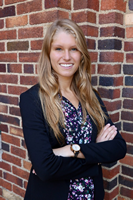 Marissa Natzke
Marissa Natzke
What does your work look like on a day-to-day basis?
I manage a public-private funder collaborative called the Michigan Opioid Partnership, direct the projects under the collaborative, and advise on health initiatives and priorities across the foundation. On a daily basis, I engage in strategic planning and relationship development, assess policy improvements and systems change, and perform typical project management activities, like developing program goals, securing interagency agreements, and managing timelines and budgets.
What advice do you have for Michigan Public Health students interested in your field?
Stay curious and humble. You will always have something new to learn and different perspectives to consider. Remember to center community voice, lean on your team, invite others in, and aim for collective impact. Big problems cannot and should not be solved in a silo.
What do you enjoy about your work/career?
I love that I get to learn from astonishingly intelligent, passionate people across the state while championing and supporting innovative work and ideas. Most importantly, I appreciate that I am in a strategic position to try to improve some of the systems that drive health inequities in our state.
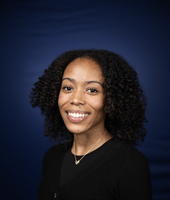 Nia Thomas
Nia Thomas
What does your work look like on a day-to-day basis?
I manage the Lead Ambassador Program at the Division of Environmental Health. This Michigan-based program provides lead health education materials to residents, especially in communities where lead levels exceed safety thresholds. We distribute important fact sheets and promotional items like bags, stress balls, etc. We aim to reach communities in non-traditional gathering spaces, making our approach even more inclusive and community-centered. Some examples of non-traditional sites we collaborate with are barber shops, beauty salons, gas stations, hardware stores, grocery stores, thrift stores, recreation centers, and much more.
My daily responsibilities involve guiding the design of this program, securing new community partnerships, and strategizing new ideas to spread the message about lead safety through non-traditional outreach. I manage the work of our program staff, create and review work assignments, develop reports, facilitate meetings, and lead educational training. Sometimes, I work entirely from home and am engaged in meetings or program planning, while other days, I'm out in the community directly, engaging with residents, providing health education, and addressing any questions or concerns.
What advice do you have for current Michigan Public Health students interested in pursuing your field?
Remember, the job search process can be a journey. It's important to update your LinkedIn profile and connect with students and professionals in similar positions or fields you're interested in. Don't put too much pressure on yourself, remain patient, and know that it's okay not to get the job on the first go. Prioritize your research, network effectively, and pack on your patience.
What do you enjoy about your work/career?
I enjoy directly engaging with the community I am from and connecting them with resources to empower them to take control of their health. I can create and implement solutions to environmental health challenges, particularly lead exposure-related, which is incredibly fulfilling.
What did your education/resources at Michigan Public Health prepare you for your role?
The Michigan Public Health Careers Office and resume workshops have been great tools in my journey to my role. I entered the environmental health field with no prior public health professional experience aside from my education. I recommend using the resources available through the Michigan Public Health and the University of Michigan. I found my current position through Handshake, which is a good platform for job opportunities.
What is the impact you see from the work you are doing in your role?
I'm proud of our overall outreach impact. Last year, we reached over 12,000 individuals through non-traditional outreach, which is incredible to make a difference in our communities. Moreover, I'm pleased to announce that after over a year of dedicated work, the expansion proposal for our youth program has been approved. This development is a testament to our commitment to keep our communities informed and safe and is now in the works.
Health System Management
Penny Yang
What does your work look like on a day-to-day basis?
As an Administrative Fellow, my days truly varied! What I thoroughly enjoyed was the ability to craft the fellowship to follow my passions and interests. When I was not in a rotation, my day-to-day looked similar to the following:
- Attending committee meetings to better understand the current healthcare system landscape
- Conducting project meetings, including update meetings, working meetings, and brainstorming sessions
- Solo work on specific tasks for projects, which include Excel work, data work, and presentation work
- Presenting at various meetings to share progress, updates, and data.
- Attending leadership rounds in different areas of the healthcare system.
When I was in rotations, I would spend the day shadowing different people in the specific department I was learning from.
What advice do you have for Michigan Public Health students interested in your field?
Put yourself out there and network! Many of my favorite and most valuable experiences from my fellowship came from networking and asking to be involved in projects.
What do you enjoy about your work/career?
I love how the VA is such a mission-forward organization. People truly care about providing the best care possible for Veterans.
How did your education/resources at Michigan Public Health prepare you for your role?
Michigan Public Health was a wonderful place for me to grow both my data and health management skills. I use my analytical thinking skills from my Epid degree daily, as well as the specific data coding skills. From my HMP degree, I use the strategic thinking concepts we learned from our courses to better understand how to drive healthcare innovation and change. I also still use my alumni network connections - my alum mentor was one of the reasons I decided to go to the VA! She worked there as well.
Health & Environmental Consulting
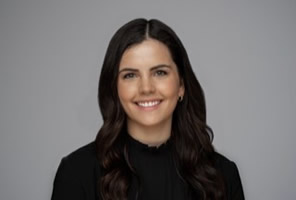 Caroline Tuohy
Caroline Tuohy
What does your work look like on a day-to-day basis?
My day-to-day activities vary significantly based on the projects I am working on. Much of my team's work is data-driven, so I usually have several analyses in progress to better understand our clients' problems. Typically, I have a few calls with internal teams or clients to discuss open items, brainstorm, or present deliverables. One of my favorite aspects of consulting is that every day looks different, depending on client needs and timelines.
What advice do you have for Michigan Public Health students interested in your field?
My advice is not to pigeonhole yourself in a particular type of work. It is so important to be open to other types of projects or experiences and be surrounded by people who push you outside your comfort zone. When I first started, I was not very comfortable with data and therefore never thought I was the right person for very data-heavy projects. With encouragement from my peers and colleagues, I have since gained experience in this which has allowed me to discover skills I never would have otherwise.
What do you enjoy about your work/career?
I enjoy the opportunity to work with a diverse range of healthcare companies, from pharmaceutical to insurance, on solving really complex problems. My consulting role has provided me with extensive on-the-job learning, not only about various healthcare issues and trends but also in honing my critical thinking and problem-solving skills.
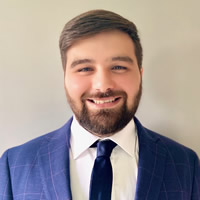 Ali Jawad
Ali Jawad
What does your work look like on a day-to-day basis?
Every day is usually a bit different, which keeps the job interesting. During travel weeks, my days comprise of flying over to my client site, meeting with clients, and sometimes white boarding thoughts, ideas, or next steps for any initiative I'm involved in. On weeks where I'm not traveling, a typical day will include joining stand-up meetings, preparing materials to share with my client, and checking in with my teams to ensure we're on track to deliver our work. It's definitely a collaborative effort, but the ability to work from home and be in the office for work comes with a lot of flexibility, which I often enjoy.
What advice do you have for Michigan Public Health students interested in your field?
For those interested in consulting, the field is vast and there's a ton of different ways to get involved. There's so many great places to work. The best piece of advice I can give people that I come across is really focus on yourself during your time at the School of Public Health and on the University of Michigan campus. It really goes by fast, so try to enjoy the little moments the best you can. As you develop your skills academically and professionally, your personality and who you are what matters most, in any profession. It's the people that make Deloitte great, so really putting yourself first and enjoying the process as much as possible is important.
What do you enjoy about your work/career?
The flexibility of being able to own my day and the work-life balance. There's a strong emphasis on well-being, so I've been tapping into the things that I enjoy outside of work a lot more in the recent past. It helps me stay grounded and focused both when I'm working and when I'm off the clock.
How did your education/resources at Michigan Public Health prepare you for your role?
The soft skills, being able to interact and build rapport with people, and thinking about things through multiple perspectives really prepared me for my role. It's not often you see a degree map really close to your work, so I'm happy that the amazing faculty and classmates I had made my transition from the academic world to the professional world really easy.
What is the impact you see from the work you are doing in your role?
It's very widespread. While my day-to-day focuses on technology-related work, the downstream effects and people that are ultimately impacted by the sorts of work we do is super important. It doesn't go unnoticed at the end of the day, and helping people never gets lost in anything that we do. We strive to make the world better, together, and I find that as super impactful.
Individualized Client & Patient Care
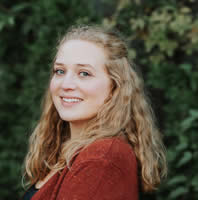 Adelyn Beil
Adelyn Beil
What does your work look like on a day-to-day basis?
My role is split between clinical work, laboratory work with Michigan Medicine Genetics Labs (MMGL), and Newborn Screening; so, there is not really a such thing as a typical day for me. In a typical week, I see patients who have or might have genetic disorders and help explain those conditions to them, ensure proper follow-up for those conditions, review testing for additional family members/recurrence risks, or order testing for patients who we think may have a genetic basis of their condition. In MMGL, I help ensure the correct genetic test was ordered, answer questions from ordering clinicians regarding testing/test results, help design tests, and help with variant analysis and report writing. Newborn screening is my favorite part of my job; I work with families who have positive newborn screens for X-Linked Adrenoleukodystrophy or Spinal Muscular Atrophy, ensure they understand what the condition is, confirm the diagnosis, and help get treatment/management started to help keep their children healthy. I also work with MDHHS, attending Newborn Screening meetings with clinicians from other hospitals as well as MDHHS employees in Newborn Screening to continue to improve outcomes and processes for these patients.
What advice do you have for Michigan Public Health students interested in your field?
Shadowing in healthcare is incredibly important to ensure you are pursing a position you truly want. I love being a genetic counselor, and I'm glad I was able to shadow other healthcare professionals to find the right fit for me.
What do you enjoy about your work/career?
I love the teaching aspects of my job, and being able to help people understand really difficult and often scary information so they feel like they have some aspect of control back in an uncontrollable situation. I also really enjoy being able to work at the state level for improving Newborn Screening processes for everyone in the state of Michigan. My role is unique in that I can see impact both at the individual patient level, as well as the wider state level.
How did your education/resources at Michigan Public Health prepare you for your role?
Having my MPH in Health Management and Policy has a been a huge asset for me in my understanding of the healthcare system. This is so helpful as a clinician, and has led me to feel more comfortable saying yes to a wider range of opportunities at Michigan Medicine.
What is the impact you see from the work you are doing in your role?
The biggest impact I see is in the individual patient care, and being able to help people through really difficult times in their lives. I find a lot of fulfillment in being there for people during tough times, and spending time helping them understand difficult concepts when there is so much new information being thrown at them. I also see improvements in a wider scope with newborn screening processes as well as lab processes/practices, and hope to continue to work on these throughout my career.
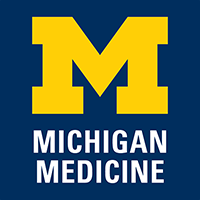 Taylor Schultz
Taylor Schultz
What does your work look like on a day-to-day basis?
As an inpatient clinical RDN I conduct comprehensive nutrition assessments and develop individualized nutrition care plans for diverse patient populations. The main services I cover include patients with a variety of GI conditions and liver transplants. My day to day includes identifying patients at nutrition risk, providing appropriate nutrition interventions (such as enteral and parenteral nutrition), providing nutrition education, and collaborating with other healthcare professionals to optimize patient outcomes.
What advice do you have for Michigan Public Health students interested in your field?
Try to gain as much experience as you can in all areas of dietetics before deciding what setting you want to work in. The cool thing about this field is there are many different areas to explore, and who knows- you may really enjoy something you didn't think you would!
What do you enjoy about your work/career?
I enjoy helping my community by providing patients with nutrition guidance for disease prevention, treatment, and recovery. I'm passionate about the potential of food to enhance lives and improve health!
